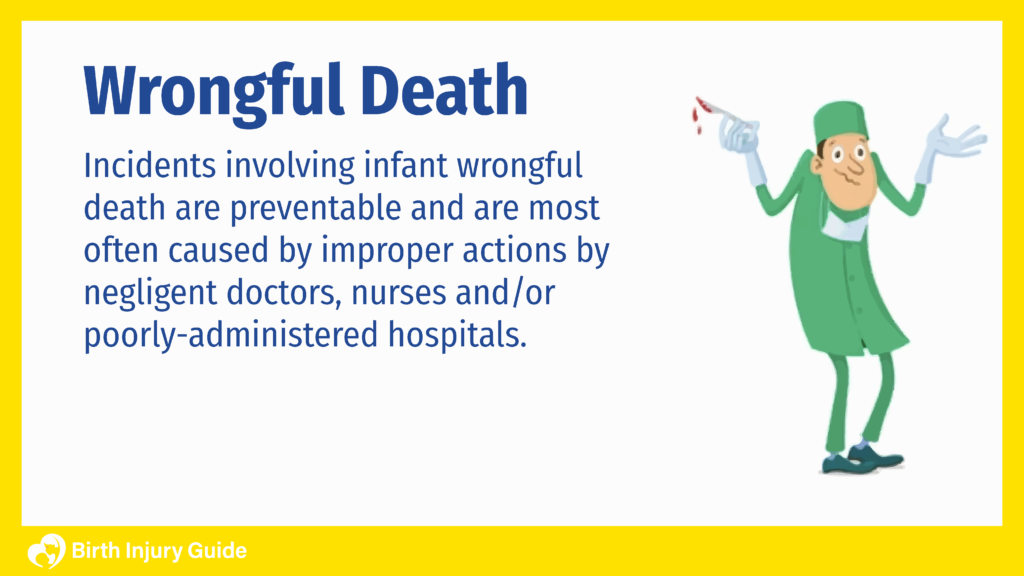
Infant Wrongful Death
A baby’s birth is usually a joyful event. However, sometimes something goes horribly wrong and an infant dies before birth or shortly after as a result of a birth injury or a medical mistake.

What is Infant Wrongful Death?
Wrongful death is a legal term applied to the death of a person caused by negligence or improper actions of another. In the case of birth injuries, infant wrongful death cases are usually filed against the medical provider either for the death of the child, the death of the mother or both. Under the eyes of the law, infant wrongful death can be considered any degree of death, including homicide.
In most infant wrongful death cases, the people who file the lawsuit, usually the parents or other relatives of the infant, sue the attending physician or other medical personnel involved in the incident. Plaintiffs may also accuse the defendant of committing manslaughter, but the laws for manslaughter vary from state to state.
How are Infant Wrongful Death Cases Examined?
Infant wrongful death cases examine the events that transpired and identify whether the defendant was negligent in his or her care. Sometimes a baby is born normally but has a birth injury due to a difficult labor and dies from that injury. In this example, the physician and/or the medical staff may be held responsible for the birth injury that led to the infant’s death.
In cases of a stillborn birth, it’s important to note that physicians and/or medical staff are not always to blame. For instance, if the mother was in a car accident that caused significant harm leading to the infant’s death, the physician and/or medical staff are not liable. However, if the doctor and/or medical staff performed an action that led to a stillborn birth, or failed to perform medical intervention that could have prevented a stillborn birth, they may be liable.
Almost all state laws that recognize stillbirth as wrongful death mandate that the infant must be viable up to the time that the stillbirth occurred in order to prove medical negligence. Viable, in medical terms, means that the infant is capable of surviving on their own outside the womb. Viability typically begins around 24 weeks gestation. If fetal death occurs before 24 weeks gestation, wrongful death generally does not apply.
It’s also important to note that not all states recognize stillbirth as wrongful death under the rationality that the infant is not yet a person. Although many think this law is absurd, some states still uphold this law. Your birth injury lawyer will be able to provide information on your state’s laws regarding stillbirth and wrongful death.
What are Some Birth Injuries that Could Result in Wrongful Death?
There are many possible birth injuries that can result in infant wrongful death. Most of these are caused by negligence on the part of the obstetrician, nurse or other medical personnel. The most common fatal birth injuries include:
Oxygen Deprivation (Hypoxia)
Oxygen deprivation is not only a principal cause of birth injuries like cerebral palsy, but it can also be fatal to an infant. This is especially dangerous for an infant that is still in the mother’s womb. Doctors and nurses in the delivery room need to be alert for any sign that the baby is not getting enough oxygen. Hypoxia deaths are often caused by the stress of labor, an umbilical cord wrapped around the infant’s neck or problems with the placenta.
In some instances, an infant can become lodged in the mother’s pelvic area, leading to oxygen deprivation. Doctors must act quickly. Unfortunately, excessive or rushed pulling when trying to get the baby out may lead to other birth injuries.
Reduced Blood Flow
Babies need a proper amount of blood flow in order for the brain and other vital organs to receive oxygen and life-sustaining nutrients. If the amount of blood an infant gets during labor is restricted for a long time or stops altogether, the brain, heart and other organs can’t function and will shut down.
Traumatic Injuries During Delivery
Traumatic injuries can cause infant wrong deaths, especially during a difficult delivery. Stress due to unexpected developments in a prolonged labor, such as infant distress while the baby is still in the birth canal, can catch a doctor off guard. In an emergency situation, a physician may act negligently. An inexperienced or nervous obstetrician can make poor decisions resulting in birth trauma.
Medication Errors in United States Hospitals
According to the National Patient Safety Foundation, medication errors harm an estimated 1.5 million people in the U.S. In a hospital setting, dispensing one medication to one patient can often involve 100 steps from start to finish. Hospitals have a high volume of prescription orders. A myriad of random events can interfere with the process. As a result, medication errors are among the most common causes of patient injuries and deaths in American hospitals. Most medication errors can be prevented by making sure that pharmacists check the markings on vials or IV bags more than once before sending medications to a patient.
Examples of Infant Wrongful Death Cases
Infant wrongful death can occur before birth, during labor and even after a baby is born. In many instances these deaths can be avoided but they occur as a result of medical negligence and poor decisions by healthcare providers and/or the hospital. In addition, a seemingly minor clerical mistake by a pharmacist or a medical equipment operator error can have deadly consequences.
Magee-Womens’ Lawsuit
In July 2014, a Pennsylvania couple sued a doctor, several hospitals, a transfusion institute and a blood bank for the death of their two-month-old son. Per the Pittsburgh Trib, Christopher and Cassi Lang of Fayette County blame their son Xander’s death partly on a tainted blood transfusion. In their lawsuit, the Langs allege that Xander was given a blood transfusion which contained Cytomegalovirus while he was in Magee-Womens Hospital’s neonatal intensive care unit (NICU). Though it is usually harmless, Cytomegalovirus can trigger complications in newborns.
Xander was in Magee’s NICU after being born prematurely in August 2012. He received a transfusion of blood from the Institute for Transfusion Medicine, Magee-Womens’ blood bank. In their complaint, the Langs allege that the blood was not screened, tested or treated for Cytomegalovirus.
“Due to the (virus), Xander Lang’s medical condition deteriorated, ultimately causing and/or contributing to his death on October 30, 2012,” the Langs’ complaint stated.
The Langs also sued Uniontown Hospital and Dr. Febenido Pascua for failing to provide proper testing and care to Cassi Lang during her pregnancy. According to the suit, she was admitted to the Uniontown emergency room at least three times for high blood pressure and other problems. In one instance, her blood pressure was 190 over 120.
When the Langs’ obstetrician was informed about the mother’s hypertension, he ordered her to go to Uniontown’s labor and delivery department. Four hours later, Cassi was transferred to Magee, where she underwent an emergency Caesarean section.
Chicago $8.5 Million Settlement
In April 2012, a Chicago hospital agreed to pay a record $8.25 million settlement to the parents of a baby who died. The baby was given a lethal dose of sodium chloride due to a pharmacy error.
Advocate Lutheran General Hospital admitted responsibility in the 2010 death of Genesis Burkett, a 40-day-old boy who was born prematurely. Genesis was in the hospital’s NICU and received a dose of sodium chloride which was over 60 times more than the amount prescribed.
Advocate Lutheran said in a statement, “This event has only heightened our focus on patient care. We have taken comprehensive steps across Advocate to ensure that this type of tragedy does not happen again.”
Genesis’ death was a result of a chain of events that happened during routine medication delivery. The process of administering medications in a hospital consists of various steps from prescription to delivery. Any distraction or disruption can be dangerous to a patient. In the Genesis Burkett case, a pharmacist processing the order for sodium chloride keyed in the wrong dosage into the machine that mixed the IV solution.

